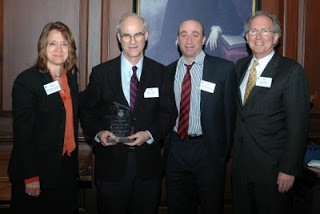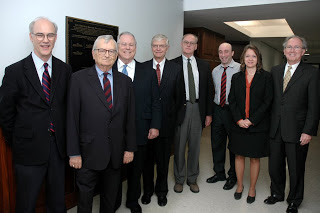October 31st, 2008 — By — In News & Events
2008 Brigham-Kanner Property Rights Conference

Pictured here: Photo 1 (left to right): Lynda L. Butler, Prof. Robert C. Ellickson, Prof. Eric A. Kades, and Joseph T. Waldo

Photo 2 (left to right) : Prof. Robert C. Ellickson, Prof. Gideon Kanner, Toby Prince Brigham, W. Taylor Reveley, III, Prof. James W. Ely, Jr., Prof. Eric A. Kades, Lynda L. Butler, Joseph T. Waldo.
The fifth annual Brigham-Kanner Property Rights Conference and presentation of the 2008 Brigham-Kanner Property Rights Prize was held the weekend of October 17th at the College of William & Mary Law School in Williamsburg, Virginia. The 2008 Brigham-Kanner Property Rights Prize was presented to Professor Robert C. Ellickson, the Walter E. Meyer Professor of Property and Urban Law at Yale Law School, during a candle lit dinner in the historic Sir Christopher Wren Building – America’s oldest academic building.
The Brigham-Kanner Property Rights Conference and Brigham-Kanner Property Rights Prize are named in recognition of Toby Prince Brigham and Gideon Kanner for their lifetime contributions to private property rights, their efforts to advance the constitutional protection of property, and their accomplishments in preserving the important role that private property plays in protecting individual and civil rights. The conference included five panel discussions focused on private property rights as well as the scholarship of Robert Ellickson.
The first panel discussion, entitled The Role of the Judiciary in the Checks and Balances Affecting Property Rights, focused on the role of jurists in the fight to protect private property interests. The panel included former Brigham-Kanner Property Rights Prize recipient Professor James W. Ely, Jr. of Vanderbilt University, the Honorable Wilford Taylor of the 8th Judicial Circuit Court of Virginia, and the Honorable Maureen O’Connor of the Supreme Court of Ohio.
Professor Ely addressed the need for the separation of governmental powers as it relates to property rights. He discussed the history of the government’s attempt to protect property rights and its efforts to ensure that the power to infringe upon those rights was not vested in a single institution.
In describing the role of the judiciary and its relation to property rights, Justice O’Connor of the Ohio Supreme Court discussed the Court’s decision in the case of Norwood v. Horney. The Court’s Norwood decision was the first opinion on the public use clause by a state high court after the controversial U.S. Supreme Court decision in Kelo v. City of New London. Discussing the unanimous opinion she authored, Justice O’Connor described the Court’s reasoning in reaching its conclusion and emphasized her belief that the opinion needed to be unanimous to appropriately affirm private property rights. Ultimately, Justice O’Connor wrote that economic benefit to the community, standing alone, was not sufficient to establish a public use for purposes of the Ohio Constitution’s takings clause.
The first panel concluded with Judge Wilford Taylor’s discussion of the role of the trial court in the protection of private property rights. His remarks focused on the role of the trial judge as the “gatekeeper” of property rights. The trial court is the first arbiter in disputes regarding property rights and, as Judge Taylor explained, it is the court’s responsibility to ensure that all property owners are treated fairly and that the law is properly applied to the facts.
The second panel of the afternoon was entitled Norms & Decentralization of Property Rights. The panel focused on Professor Ellickson’s research on the effects societal norms have on private property rights. The members of the panel included Professor Nicole Stelle Garnett of the University of Notre Dame Law School, Professor Roderick Hills, Jr. of New York University Law School, and Professor Stewart Sterk of Cardozo Law School.
Professor Garnett focused on the effect social norms have on the allocation of public spaces. She discussed how social norms could have both positive and negative effects on public spaces ranging from social activities such as neighborhood barbecues to gang activities. Professor Garnett also discussed norm enforcers at length, focusing on the role of the public-at-large as well as law enforcement officers in curbing behavior outside social norms and analyzing the norms of certain law enforcement scenarios.
Professor Hills’ prepared remarks addressed the evolution of the decentralization of property rights in America. He described the change in view from the late 1960’s and 1970’s in which many believed that property rights would be federalized to the belief today, after Kelo, that the protection of property rights would fall to the state and local levels. Professor Hills stressed that decentralization of property rights simply means looking to other sources of law for protection and that perhaps it is beneficial that there is no national public use doctrine.
Concluding the afternoon forum, Professor Sterk discussed contracts as they relate to social norms and the public’s increasing unwillingness to read legal documents. Professor Sterk argued that courts in the interpreting and enforcing legal documents are ignoring the language of the documents because the social norm is for parties not to read them.
The first day of the conference concluded with the dedication of the Brigham-Kanner Property Rights Prize plaque followed by a reception and dinner in the Wren Building at which Professor Ellickson was presented with the 2008 Brigham-Kanner Prize. During his acceptance, Professor Ellickson reminded the audience that while property rights scholars and advocates are a small group with limited recognition, the benefits of their work is far reaching.
The second day of the Fifth Annual Brigham-Kanner Property Rights Conference commenced with a panel discussion focusing solely on Professor Ellickson’s property scholarship. The panelists included Carol M. Rose of the University of Arizona, Eduardo M. Peñalver of Cornell University, Lee Fennell of the University of Chicago, and Henry Smith of Yale Law School. The speakers together discussed the broad themes and underlying views central to Professor Ellickson’s research and publications. Among the main themes central to Professor Ellickson’s scholarship are the decentralization of property rights and a libertarian view of appropriate governmental intervention.
The second panel of the day was entitled, How Will Global Warming Change the Climate for Property Rights, and included OCA member Michael Berger from Manatt, Phelps & Phillips, LLP, and Eric Kades of William & Mary Law School. The panelists debated the effect of climate change on private property rights and the possibility that global warming may require limitations on the rights currently enjoyed by property owners. Mr. Berger argued that property rights are protected by the United States Constitution and that any statutory efforts to curtail those rights would be trumped by the Supremacy Clause. Conversely, Professor Kades described the Constitution as a living document and argued that fundamental changes to property rights would be needed to address the growing concerns over global warming.
The final panel of the 2008 Brigham-Kanner Property Rights Conference featured the two men for whom the conference was named. Toby Prince Brigham spoke on the topic of Human Nature & Property Rights and Gideon Kanner discussed Juxtaposition of Judicial Rhetoric and Judge-Made Compensability Rules – Indemnity or Kleptocracy? Mr. Brigham focused on the changes in the law of eminent domain in Florida during his years of practice and explained that property rights have been recognized for thousands of years. Mr. Brigham emphasized that, given the long history of protection of the right to own property, there is no need to reinvent the rights of the owner. He closed by stating the best method of preserving property rights is to honor the principles of the Constitution and to maintain the rights that have always been afforded by it. Gideon Kanner discussed the standards employed by the courts in determining just compensation and criticized judges who developed independent compensability rules. He reemphasized the belief that juries should determine just compensation and should do so in accordance with the governing laws, not according to the whims of the bench.
The 2008 Brigham-Kanner Property Rights Conference was video recorded and can be purchased by contacting Mary Beth Dalton (medalt@wm.edu) at the College of William & Mary’s Law School.
The above post was authored by Brian G. Kunze, Esq., an associate with The Law Firm of Waldo and Lyle, P.C. in Norfolk, Virginia. Mr. Kunze and the attorneys at Waldo & Lyle limit their practice exclusively to the defense of private property owners in eminent domain and condemnation proceedings. Waldo & Lyle, P.C. serve property owners in Virginia and throughout the mid-Atlantic. Joseph T. Waldo, Esq. is the Virginia Member of the Owners’ Counsel of America.



